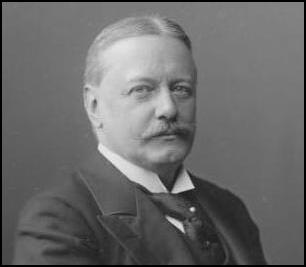Bernhard von Bulow
Bernhard von Bülow was born in Germany on 3rd My 1849. He held several diplomatic posts before he was appointed as State Secretary in 1897. Bülow was promoted to Chancellor by Kaiser Wilhelm II on 16th October 1900. He adopted an aggressive foreign policy and upset France by his actions in Morocco in 1905. He also antagonized Russia in the Bosnian crisis in 1908. His foreign policy encouraged the formation of the Triple Entente.
In October 1908 Kaiser Wilhelm II gave an interview to the Daily Telegraph where he indiscreetly revealed his desire for a larger navy. Bülow, who approved the interview, was blamed for the arm's race that followed. Bülow held office until June 1909 when he was forced to resign after losing support in the Reichstag and was replaced by Theobald von Bethmann-Hollweg.
Bülow served as ambassador to Italy (1914-15) and published a book on foreign policy, Imperial Germany.
Bernhard von Bülow died on 28th October 1929.

Primary Sources
(1) Kaiser Wilhelm II gave an interview to the Daily Telegraph that was published on 28th October 1908.
Germany is a young and growing empire. She has a world-wide commerce which is rapidly expanding and to which the legitimate ambition of patriotic Germans refuses to assign any bounds. Germany must have a powerful fleet to protect that commerce and her manifold interests in even the most distant seas. She expects those interests to go on growing, and she must be able to champion them manfully in any quarter of the globe. Her horizons stretch far away. She must be prepared for any eventualities in the Far East. Who can foresee what may take place in the Pacific in the days to come, days not so distant as some believe, but days at any rate, for which all European powers with Far Eastern interests ought steadily to prepare?
Look at the accomplished rise of Japan; think of the possible national awakening of China; and then judge of the vast problems of the Pacific. Only those powers that have great navies will be listened to with respect when the future of the Pacific comes to be solved; and if for that reason only, Germany must have a powerful fleet. It may even be that England herself will be glad that Germany has a fleet when they speak together on the same side in the great debates of the future.
(2) Bernhard von Bülow, Imperial Germany (1914)
The choice for Germany was to gain world power, or go into decline and downfall. Under these conditions the position of Germany is extraordinarily difficult. We not only require for the full material development of our nation, on a scale corresponding to its intellectual importance, an extended political basis, but we are compelled to obtain space for our increasing population and markets for our growing industries. But at every step which we take in this direction England will resolutely oppose us. English policy may not yet have made the definite decision to attack us; but it doubtless wishes, by all and every means, even the most extreme, to hinder every further expansion of German international influence and of German maritime power The recognized political aims of England and the attitude of the English Government leave no doubt on this point. But if we were involved in a struggle with England, we can be quite sure that France would not neglect the opportunity of attacking our flank.
We have fought in the last great wars for our national union and our position among the powers of Europe; we now must decide whether we wish to develop into and maintain a world empire, and procure for German spirit and German ideas that fit recognition which has been hitherto withheld from them.
Have we the energy to aspire to that great goal? Are we prepared to make the sacrifices which such an effort will doubtless cost us? or are we willing to recoil before the hostile forces, and sink step by step lower in our economic, political and national importance? That is what is involved in our decision.
If, as is right, we do not wish to assume the responsibility for such a catastrophe, we must have the courage to strive with every means to attain that increase of power which we are entitled to claim, even at the risk of a war with numerically superior foes.
(3) Bernhard von Bülow, Imperial Germany (1914)
A great oppression which weighed on the spirit of the nation could be lifted if the German Emperor could set before his people, who at that time were not united either by common hopes or demands, a new goal towards which to strive, and could indicate to them "a place in the sun" to which they had a right, and which they must try to attain. On the other hand, patriotic feeling must not be roused to such an extent as to damage irreparably our relations with England. To make it possible to build a sufficient fleet was the foremost and greatest task of German policy after Bismarck's retirement.
It was both necessary and desirable for us to be so strong at sea that no Sea Power could attack us without risk, so that we might be free to protect our oversea interests, independently of the influence and the choice of other Sea Powers. Our vigorous national development, mainly in the industrial sphere, forced us to cross the ocean. For the sake of our interests, as well as of our honour and dignity, we were obliged to see that we won for our international policy the same independence that we had secured for our European policy. The fulfilment of this national duty might eventually be rendered more difficult by English opposition, but no opposition in the world could release us from it.

